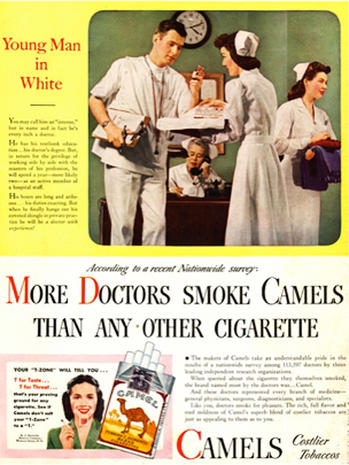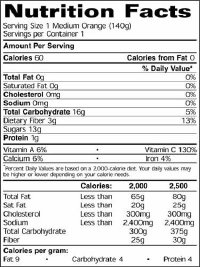41 health claims on labels
Nutrition content claims and health claims There are 2 types of health claims - general and high level. General level health claims are about a nutrient or substance in a food, or the food itself, and its effect on health. For example: 'calcium for healthy bones and teeth'. Health Claims - Canada.ca The Food Directorate of Health Canada is responsible for the development of policies, regulations and standards that relate to the use of health claims on foods. Health claims on foods may help people make informed decisions about food choices provided they are truthful and not misleading. The Food Directorate assesses whether health claims are truthful and not misleading by reviewing mandatory and voluntary pre-market submissions.
Health claims | EFSA A health claim is any statement on labels, advertising or other marketing products that health benefits can result from consuming a given food, for instance that a food can help reinforce the body's natural defences or enhance learning ability. EFSA's role EFSA's work includes providing scientific advice on:

Health claims on labels
Understanding Food Labels and Health Claims - Nutrition ... No labels can make claims of diagnosis, cures, treatment, or disease prevention. If you find food or drinks that make wild claims of curing or treating a disease or symptom (or making you lose weight or gain muscle), note that it is NOT TRUE. These are not valid or allowed claims on food labels. Test You Knowledge Allergy Warnings EUR-Lex - l21306 - EN - EUR-Lex - Europa It aims to ensure that nutrition claims* and health claims* on food labels and in presentations and advertising are clear and based on evidence that is generally accepted by the scientific community. There is a wide range of substances, such as vitamins, minerals, amino acids, essential fatty acids, fibre and herbal extracts, with a nutritional ... Nutrition & Health Claims | Science & Health | The Food ... Nutrition & Health Claims. If you are making a nutrition or health claim about your product you must comply with Regulation 1924/2006 on nutrition and health claims made on foods.. A list of approved health claims and conditions for their use, rejected health claims, and permitted nutrition claims have been published by the European Commission and are listed in the Community Register (see ...
Health claims on labels. In Pictures: 29 Foods With "Health Claims" That Are ... #6 Chocolate Milk - "Vitamins A&D 37% Less Fat Than Whole Milk!" Ingredients? Okay, so there's actually milk in this. Good sign. Ingredient #2 = sugar. Ingredient #3-6 = cocoa mix science experiment & preservatives. Ingredient # 4 = Artificial flavors. De-lish. #7 Arizona Iced Tea "NO Calories!" At first we're like, "oh, sweet, no calories!?" Food labelling and packaging: Nutrition, health claims and ... Nutrition, health claims and supplement labelling Nutrition labelling You must follow nutrition labelling information rules for all pre-packed products unless both of the following apply: you're a... 5 health claims on food labels you should understand | My ... Here's some help with how to be an informed reader of health claims on food labels. There are so many health claims on food labels that it is often hard to know what to believe. And many claims cannot be trusted. Here's some help in understanding these labels, so you can make the choices based on what is important to you. Here is a guide to ... Label Claims for Conventional Foods and Dietary ... Label Claims for Conventional Foods and Dietary Supplements Health Claims. Health claims describe a relationship between a food substance (a food, food component, or dietary... Nutrient Content Claims. The Nutrition Labeling and Education Act of 1990 (NLEA) permits the use of label claims that... ...
Function claims - Health claims on food labels - Food ... Function claims (definition) relate to the effects that a food has on the normal functions of the body. They are based on the role that the food or the food constituent plays when consumed at levels consistent with normal dietary patterns. Function claims also contain two subcategories of claims: Nutrient Function Claims Probiotic Claims EU Register of nutrition and health claims made on foods ... Health claims submitted as Article 13(1) 'function claims' (8 Kb) but that do not qualify as such. Health claims not related to human health (6 Kb) which cannot consequently be used on foods. Health claims for combinations of substances (7 Kb) where health claims are already authorised for some of the individual substances. Food Packaging Claims - American Heart Association There are three categories of claims defined by statute and/or FDA regulations that can be used on food and dietary supplement labels: health claims, nutrient content claims, and; structure/function claims. A "health claim" by definition has two essential components: A substance (whether a food, food component, or dietary ingredient) and Health claims - Food Standards Agency - Food labelling e ... The use of a health claim triggers the need for further statement (s) in the labelling, presentation or advertising of the food in question. These relate to the general importance of a healthy diet...
Nutrition and health claims: guidance to compliance with ... Health claims authorised on the basis of proprietary data Health claims that have been authorised on the basis of proprietary data are listed in a separate Annex to the GB NHC Register. Products... Health claim - Wikipedia A health claim on a food label and in food marketing is a claim by a manufacturer of food products that their food will reduce the risk of developing a disease or condition. For example, it is claimed by the manufacturers of oat cereals that oat bran can reduce cholesterol, which will lower the chances of developing serious heart conditions. Vague health claims include that the food inside is "healthy," "organic," "low fat," "non-GMO," "no sugar added," or "natural". Health claims are also made Nutrition and Health Claims - Food Safety The rules of the Regulation apply to nutrition claims (such as "low fat", "high fibre") and to health claims (such as "Vitamin D is needed for the normal growth and development of bone in children"). The objective of those rules is to ensure that any claim made on a food's labelling, presentation or advertising in the European Union is clear, accurate and based on scientific evidence. General health claims - Health claims on food labels ... General health claims are often used in conjunction with trademarks or logos, for example, heart symbols. For information on third-party endorsements, logos and heart symbols, refer to Pictures, Vignettes, Logos and Trade Marks. Use of the terms "nutritious" and "healthy"
Nutrition, health and related claims - Food Standards Health claims You can only base health claims on food-health relationships that have been substantiated according to Standard 1.2.7. All health claims must be supported by scientific evidence to the same degree of certainty, whether they are pre-approved by us or self-substantiated by food businesses. General level health claims
Health Claims on Food Labels - LabelCalc Health claims, according to the FDA, are statements about the relationship between a food product or ingredient and a reduced risk of disease or a health condition. Basically, the FDA distinguishes two kinds of health claims: "authorized" and "qualified." Authorized Health Claims: Claims that have significant scientific agreement (SSA). This means there is a consensus in the publically available scientific information on the matter.
What You Need to Know About Health Claims on Food Labels ... In general, health claims are statements made on food product labels or dietary supplements that boast some type of health benefit. This may seem simple, but the FDA doesn't treat every claim the same way. Label claims come in multiple forms: Health claims (which comprise of authorized health claims and qualified health claims)
What are some examples of an FDA health claim on a food label? Health Claims - Require premarket approval by the U.S. Food and Drug Administration (FDA) if they are intended for use on the label of foods or dietary supplements. Qualified health claims are based on less scientific evidence than authorized health claims and require disclaimers or qualified wording.
Regulating health claims on food labels using nutrient ... Objective: Proposed Australian regulation of claims on food labels includes requirements for products carrying a health claim to meet nutrient profiling criteria. This would not apply to nutrition content claims. The present study investigated the number and healthiness of products carrying claims and the impact of the proposed regulation.
Decoding the Nutrition Label: Health Claims and Nutrient ... The nutrition label has plenty of information to help you make healthy choices at the grocery store. The nutrition label includes the Nutrition Facts table, the ingredient list, health claims and nutrient content claims. Health claims and nutrient content claims are two tools found on pre-packaged foods that can help you make healthy choices.
Health Claims on Food Labels - Consumer Reports Health Claims on Food Labels: What's True, What Isn't A guide to what 'natural,' 'multigrain,' 'free-range,' and more really mean By Sally Wadyka January 07, 2019 R eading the information on food...

Homemade Foods | Food Safety Program | Environmental Health & Safety | Health Services | County ...
Nutrient Content Claim vs Health Claim - LabelCalc When using "qualified" health claims, you must include a disclaimer or qualifier that makes the amount of scientific evidence clear so as not to mislead consumers. An example of a qualified health claim is, "Some scientific evidence supports, but does not prove, that eating X servings of whole grains per day may reduce the risk of Type 2 diabetes." Again, be sure to familiarize yourself with the list of qualified health claims to ensure you are using them correctly.





Post a Comment for "41 health claims on labels"